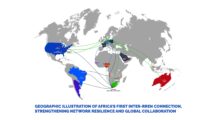National Research and Education Networks (NRENs) best learn from each other. Over the years, emerging NRENs have found that learning by visiting established NRENs speeds up learning. Under the AfricaConnect 3 project, co-funded by the EU, UbuntuNet Alliance has fostered this initiative by supporting staff exchanges every year to allow staff from one NREN to visit another NREN for a week to learn hands-on and share experience. In 2023 alone, between July and August, the Alliance sponsored five successful staff exchange programmes. The staff exchange programmes are part of the NREN capacity building activities carried out under the AfricaConnect3 project which the European Union co-funds.
On the invitation of Burundi Education and Research Network (BERNET), the Kenya Education Network (KENET) CEO, accompanied by a network engineer, held a 3-day workshop in Bujumbura to talk to the member institutions on how best to grow the NREN and continue fostering more interaction between themselves. Zambia Education Research Network (ZAMREN) also sent their CTO and Network Manager to KENET and RENU, respectively. The two exchange programmes allowed the staff to learn more about the NRENs and their operations especially in areas such as the setup of data center and the extension of the eduroam service to areas where optic fiber connectivity may not be possible.

Tanzania Research and Education Network (TERNET) also sent two Network Engineers to RENU for one week. Through the exchange, the technical staff gained hands-on experience on what services RENU extends to their members such as eduroam and IDP. Also, there were in-depth conversations in cybersecurity, datacenter operations and cloud computing. While appreciating the opportunity for the staff exchange, the TERNET Network Engineers confirmed that they successfully deployed a radius server and proxy server in their organization and connected it to the Alliance’s proxies, making the eduroam more operational than before.
Zimbabwe Research and Education Network (ZIMREN) also had the opportunity to send one of their Network Engineers to ZAMREN. Through the exchange programme, the staff gained more technical expertise in networking and research infrastructure management, institutional improvement in terms of best practices and increased international visibility.
Overall, the Staff Exchange Programs were a resounding success, exemplifying the importance and benefits of such initiatives which are made possible by co-funding from the EU through the AfricaConnect project. The outcomes of the program are invaluable to the NRENs, as they contribute to their growth, capacity building, and international recognition. The Alliance will continue implementing similar programmes in future as a way of fostering this growth among its member NRENs. We encourage more NRENs to grab the opportunity and enroll their staff in the programme. And as they say: united we stand, divided we fall.





